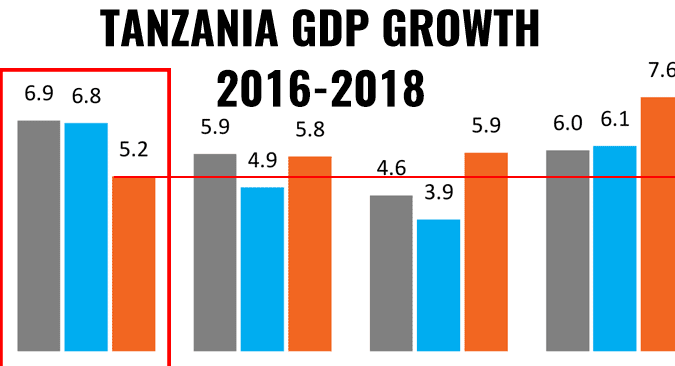Tanzania, a diverse East African nation, has experienced significant economic growth in recent years, driven by various factors that influence its Gross Domestic Product (GDP). This article delves into the key determinants shaping Tanzania’s GDP, providing insights into the country’s economic landscape.

Tanzania’s GDP
Agriculture and Natural Resources
One of the primary factors influencing Tanzania’s GDP is its abundant natural resources and agriculture. Agriculture plays a pivotal role, contributing significantly to the nation’s economy. The cultivation of crops like maize, rice, and cashews, along with livestock farming, drives substantial GDP growth.
Mining and Minerals
Tanzania is rich in mineral resources, such as gold, diamonds, and gemstones. The mining sector contributes substantially to GDP, attracting foreign investments and creating employment opportunities. Government policies that encourage responsible mining practices have contributed to this growth.
Tourism
The tourism industry has flourished in Tanzania, with attractions like Mount Kilimanjaro, Serengeti National Park, and Zanzibar’s pristine beaches drawing travellers from across the globe. Tourism-related activities contribute significantly to the country’s GDP, providing jobs and foreign exchange earnings.
Infrastructure Development
Investments in infrastructure, including roads, ports, and energy projects, have spurred economic growth by reducing transportation costs and enhancing connectivity. Infrastructure development not only boosts domestic trade but also attracts foreign investments.
Foreign Direct Investments
Tanzania has attracted substantial Foreign Direct Investments (FDIs) in recent years, particularly in sectors like telecommunications, energy, and manufacturing. These investments drive industrialization, create jobs, and stimulate economic growth.
Political Stability and Governance
Political stability and good governance are vital factors contributing to Tanzania’s economic growth. A stable political environment encourages both domestic and foreign investments, fostering business confidence and economic development.
Regional Trade
Tanzania’s strategic location within the East African Community (EAC) has facilitated regional trade. The EAC provides access to a larger market, promoting exports and economic growth.
Education and Human Capital
Investments in education and human capital development have resulted in a skilled workforce, fostering innovation and productivity.
Fiscal Policies
The Tanzanian government has implemented prudent fiscal policies aimed at managing inflation and maintaining macroeconomic stability. These policies provide a conducive environment for investment and sustainable economic growth.
Social Services
Improvements in healthcare and access to basic social services have improved the quality of life for Tanzanians. A healthy and educated workforce is more productive, contributing positively to GDP.
Rural-Urban Migration
Internal migration from rural to urban areas has resulted in urbanization, with cities like Dar es Salaam experiencing significant growth. Urban areas contribute substantially to GDP, offering employment opportunities and infrastructure development.
Global Economic Trends
Being part of the global economy, the country is susceptible to external shocks.
Investment in Renewable Energy
Tanzania has been investing in renewable energy sources like wind, solar, and hydropower. This shift towards cleaner and more sustainable energy not only contributes to GDP growth but also reduces the country’s reliance on fossil fuels.
Agricultural Reforms
Government initiatives and reforms in the agricultural sector aim to improve productivity, crop diversification, and market access for smallholder farmers. These measures are critical in ensuring food security and enhancing the agricultural contribution to GDP.
Export Diversification
Efforts to diversify the country’s export base beyond traditional commodities like minerals and agricultural products contribute to GDP stability. Expanding into new markets and industries reduces the vulnerability to external shocks.
Financial Sector Development
A well-developed financial sector, including banking and microfinance, facilitates access to credit and investment opportunities for businesses and individuals. This fosters entrepreneurship, leading to economic growth.
Economic Partnerships
Bilateral and regional economic partnerships and agreements can significantly impact Tanzania’s GDP. Trade agreements with neighbouring countries and international organizations provide opportunities for increased exports and foreign investments.
Environmental Sustainability
Sustainable environmental practices, including wildlife conservation and responsible land use, are vital. These practices not only preserve Tanzania’s unique ecosystems but also support eco-tourism, an important contributor to GDP.
Information and Communication Technology (ICT)
The growth of the ICT sector, including mobile telecommunications and internet access, has facilitated financial inclusion, e-commerce, and digital innovation. These developments enhance economic activities and contribute to GDP.
Access to Finance for Small and Medium Enterprises (SMEs)
Supporting SMEs through improved access to finance and business development services can stimulate economic growth. SMEs play a crucial role in employment creation and innovation.
Infrastructure Development
Improvements in transportation, such as road networks, ports, and railways, have a direct impact on the economy. Enhanced infrastructure reduces transportation costs, boosts trade, and encourages foreign investments.
Government Policies and Regulations
Stable and business-friendly government policies can attract foreign direct investments (FDIs) and promote domestic investments. Regulations that encourage entrepreneurship and protect property rights are crucial for economic growth.
Disaster Preparedness and Climate Change Resilience
Tanzania is prone to climate-related challenges like droughts and floods. Effective disaster preparedness and climate change resilience measures are essential to protect livelihoods and prevent economic setbacks.
Conclusion
Investments in human capital, fiscal policies, and regional trade also contribute to economic growth. As Tanzania continues to develop and diversify its economy, maintaining these positive influences while addressing challenges will be crucial for sustained GDP growth and improved living standards for its citizens.




